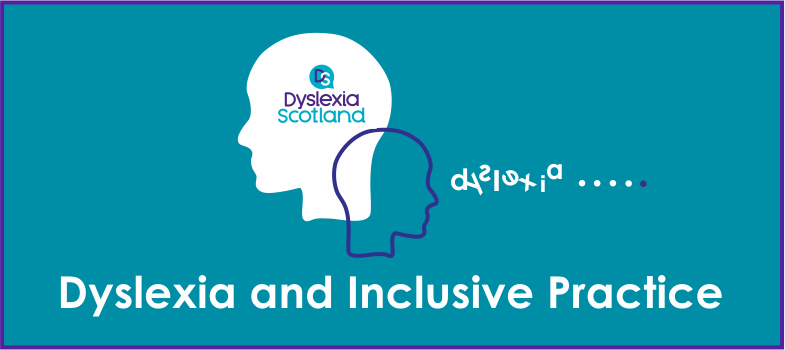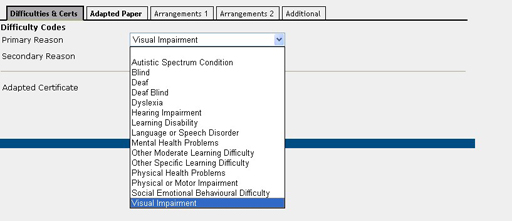2.7 Assessment Arrangements
SQA Assessment Arrangements
The purpose of assessment arrangements is to provide candidates with an equal opportunity to demonstrate their attainment without compromising the integrity of the assessment. Candidates are individuals with a diverse range of needs and it is important that you consider the individual assessment needs of your candidates when considering the most appropriate assessment arrangements.
In line with the Equality Act 2010) the Scottish Qualifications Authority (SQA) will, as far as possible, ensure that barriers to internal and external assessment are avoided in the specifications for qualifications, and will make reasonable adjustments/ assessment arrangements for disabled candidates and/or those identified as having additional support needs. Assessment arrangements are adjustments to the published arrangements and are intended for young people who can achieve the national standards, but cannot do so by the published assessment arrangements – the reason for this might be a physical disability, a sensory impairment, a learning difficulty or a temporary problem at the time of the assessment.
In school settings a ‘formal’ or independently provided identification of need is not required for a learner to be provided with appropriate assessment arrangements. The determining factor is providing evidence that the candidate has been identified as having a particular difficulty and that support in accessing the assessment and demonstrating attainment is needed. The collaborative identification process supports this approach.
Examples of assessment arrangements:
- Adapted question papers
- Assistance in aural assessments
- Extra time may be permitted in any timed assessments
- Extension to deadlines
- Use of ICT or Digital Question Papers
- Numerical Support in Mathematics Assessments
- Practical assistant
- Prompters
- Reader
- Referral of a candidate’s scripts to the principal assessor
- Scribe
- Using sign language in SQA assessments
- Supervised breaks or rest periods in a timed assessment
- Transcription with correction of spelling and punctuation
- Transcription without correction
You must submit requests using the Assessment Arrangements Request (AAR) software for all assessment arrangements required in the external Diet of examinations. In submitting requests for the external examination it is understood that the arrangements requested may also be used in any assessments undertaken internally. Each year, in October, access details and a link to the AAR user guide will be e-mailed to your SQA co-ordinator.
Figure 13 provides a screenshot. This information on different categories of difficulties is collated for internal use within the SQA is should not be interpreted as a requirement to have a formal diagnosis.
For candidates who are disabled, as defined under the provisions of the Equality Act 2010*, assessment arrangements might be the ‘reasonable adjustments’ required to compensate for a substantial disadvantage, but there may be other unique adjustments that need to be made to meet their individual needs.
However, it is important to recognise that some adjustments may not be possible for some qualifications. It is not possible to make an adjustment to the standard of the qualification where to do so would mean that it did not provide a reliable indication of the knowledge, skills and understanding of the candidate. Some candidates, defined as having additional support needs under the Education (Additional Support for Learning) (Scotland) Act 2009, may also need an assessment arrangement to meet their identified physical (including medical or sensory), behavioural, mental health or learning difficulty.
Not all candidates with assessment needs will be disabled and, conversely, not all disabled candidates will necessarily require assessment arrangements to enable them to access an assessment and demonstrate their attainment. In all cases, it is the individual assessment needs of candidates that must be the basis for the provision of an assessment arrangement. This means that SQA centres (schools) have a critical role in ensuring that the process of providing assessment arrangements is fair and operates with integrity.
Candidates for whom assessment arrangements are provided should potentially have the ability to achieve the national standards, but be unable to do so using the published assessment procedures
Important factors to remember:
- The integrity of the qualification must be maintained.
- Assessment arrangements should be tailored to meet a candidate’s individual needs.
- Assessment arrangements should reflect, as far as possible, the candidate’s normal way of learning and producing work.
However, there may be situations where a candidate’s particular way of working in the learning environment is not acceptable in an assessment. For example, a candidate who has a language and communication impairment, and who normally has someone in class supporting them by explaining words and terms, would not be allowed such support in the externally-set examination question paper. For this reason, it is very important that candidates are aware of, and have practice in, working in a way that reflects what is going to be allowed as support in the assessment situation
You can access ‘further information from the SQA [Tip: hold Ctrl and click a link to open it in a new tab. (Hide tip)] ’ - ‘Assessment Arrangements Explained: Information for centres’ and ‘Quality Assurance of Assessment Arrangements in Internal and External Assessments: Information for Schools’ which can be found here
https://www.sqa.org.uk/ sqa/ 14976.html
2.6 Standardised assessments

